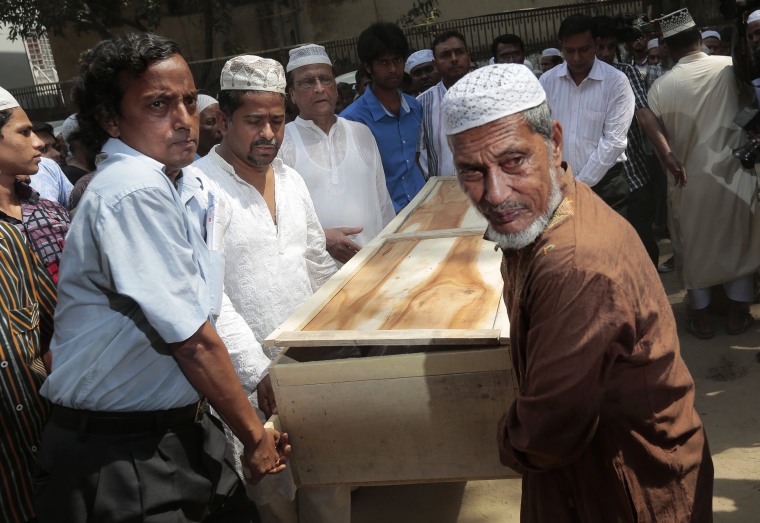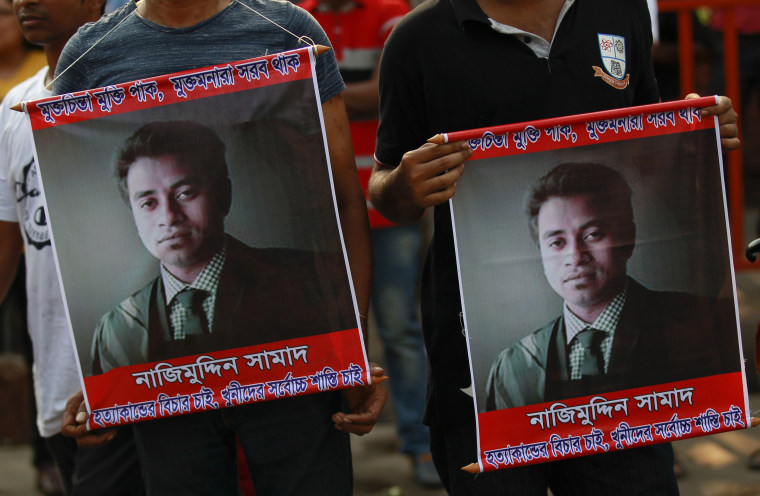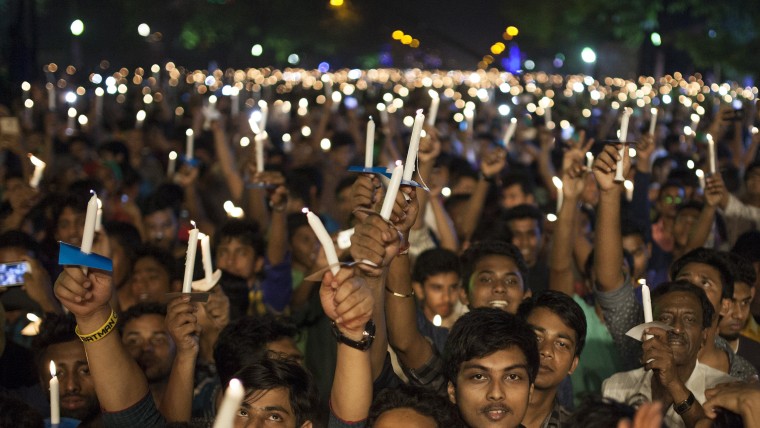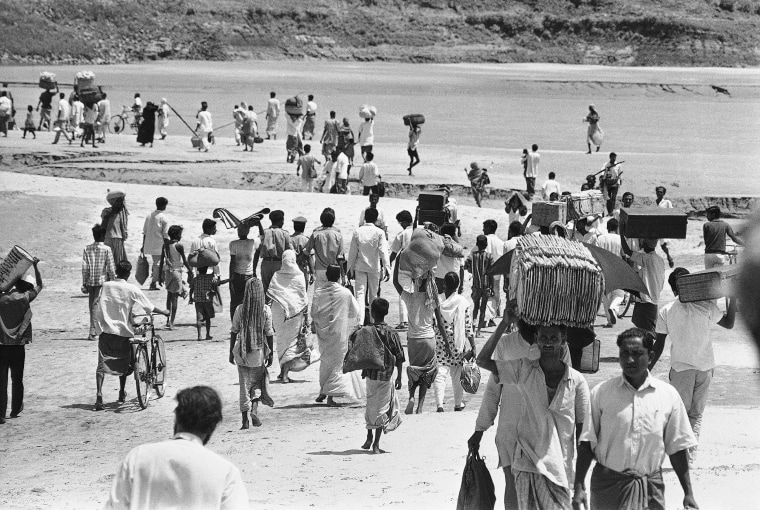The murder of a gay rights activist and his friend in Bangladesh this week was the latest in a trend of Islamist extremists killing liberals in the South Asian country.
But scratch beneath the surface, and experts say that the brutal attacks are a symptom of a nation suffering at the hands of its government — a country where it's all too easy to get away with murder.
What happened?
Bangladeshi gay rights activist Xulhaz Mannan and actor Mahbub Rabbi Tonoy were hacked to death with knives at Mannan's apartment Monday in the country's sprawling capital, Dhaka.
Mannan, 35, was editor of the conservative Muslim country's only LGBT magazine.
He also worked for the United States Agency for International Development (USAID) and "was affiliated with the U.S. Embassy," according to the State Department.

Police said Mannan and Tonoy, 25, were lured to their deaths by a man posing as a delivery driver. When the pair came to the door to collect the package, five other men rushed out and attacked them.
Al Qaeda's affiliate in Bangladesh — Ansar-al Islam — released a statement Tuesday claiming responsibly for the attack.
The group said it killed the pair because they were "the pioneers of practicing and promoting homosexuality in Bangladesh."
Not the first time
Mannan's murder adds to the more than half a dozen fatal attacks on liberals and bloggers since the start of last year.
Earlier this month, three masked men armed with machetes attacked a 28-year-old student activist named Nazimuddin Samad after he finished a college law class. He was targeted principally because he was an outspoken atheist, local police told The Associated Press.

On Saturday, university English professor A.F.M. Rezaul Karim Siddique was hacked to death while on his way to work.
Five secular bloggers were killed in a similar fashion during 2015, and "not a single person has been held to account," according to human rights group Amnesty International.
What's behind the trend?
Local police and analysts say the victims were killed because their liberal beliefs jarred with the more hard-line elements in Bangladesh's conservative-religious society.
"They are the most visible and vocal representation of a worldview intolerable to radical Islamists," said Nilim Dutta, director of Delhi-based think tank the Strategic Research and Analysis Organization.
For the extremists the killings have the added benefit of bringing "the kind of media attention that their killers seek," Dutta said in an email to NBC News on Tuesday.
It's not just al Qaeda's offshoot carrying out attacks. ISIS claimed responsibility for killing a police officer at a checkpoint last November.
Although other countries have been struggling with their own battles against Islamist violence, experts said Bangladesh's seemingly brazen form of extremism has been left unchecked amid a longstanding political crises.
A bitter conflict between Bangladesh's secular ruling party, the Awami League, and the opposition Nationalist Party (BNP) dates back decades.
That has caused a "breakdown of law and order and a political vacuum," according to Shehryar Fazli, a senior analyst at the International Crisis Group who is based in Pakistan.
Fazli said organs of the state — such as police and the courts — have become increasingly politicized, focusing on detaining opponents and silencing dissenters and that security forces have been unable or unwilling to uphold the basic rule of law.
"Criminal networks operate knowing they can do so without facing punishment … and increasingly now extremist networks [do too]," Fazli added.
How can this happen under a secular government?
Prime Minister Sheikh Hasina claims to be cracking down on the country's security woes, but human rights groups allege that security forces have been carrying out killings and "forced disappearances" of opposition figures in recent years.
After Monday's killings, Amnesty International again urged the Bangladeshi police to hold the perpetrators of these attacks to account.
For Talha Ahmad, a Bangladesh-born lawyer and commentator based in London, "the government's own hands are stained with blood" because of its lack of action.
"It's so easy to get away with murder in Bangladesh," he told NBC News.
Furthermore, the state has prosecuted several opposition figures for alleged war crimes during the Bangladesh Liberation War of 1971.
Heavily criticized as unfair by Human Rights Watch and others, these trials have further sought to deepen the divide between the extremists and secular society.
"The process is so opaque that it's given the religious right-wing groups the opportunity to mobilize," Fazli said. "It's a secular government that nevertheless produces an Islamist backlash from people who present the trials as an attack on Islam."
Before Ansar-al Islam's claim of responsibility, Hasina blamed Monday's attack on her BNP political opposition, as well as its ally, the the fundamentalist Jamaat-e-Islami group, the AP reported.
Hasina is an arch rival of BNP leader Khaleda Zia, who governed Bangladesh until 2006.

Zia's husband, Ziaur Rahman, rose to army general and then president following a coup in 1975 in which Hasina's father, Sheikh Mujibur Rahman — then president of Bangladesh — was assassinated by security forces along with his wife and Hasina's siblings.
Rahman was himself assassinated during another coup in 1981.
In an interview with the Guardian last September, Hasina denied allegations that democracy and rule of law were being undermined by the increasingly authoritarian behavior of her state.
"All the democratic institutions are working and people are satisfied and people are enjoying it," she told the newspaper. "So the way you say I am dominating, I am not dominating. I am serving people."
History plays a role, too
Bangladesh is one of the world's most densely populated countries, its 168 million people crammed into a space around the size of Georgia.
The 90-percent-Muslim country gained independence in the 1971 war, a conflict that cost some 3 million lives according to the government.
"Bangladesh has a long history of violence," said Fazli at the International Crisis Group. "Its birth was a very violent birth — there were lots of armed groups hanging around after independence. It's always been a very violent country with a lot of guns."

Ahmad agreed, saying that the killing of activists and bloggers only represented a small part of the picture noticed by Western media.
"Unfortunately in Bangladesh murder is commonplace and is becoming increasingly so," he said. "Police play a bystander role in all of these investigations."
